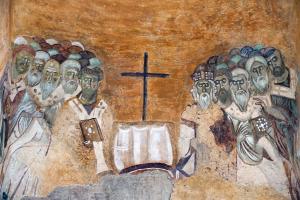
Who is Jesus Christ? As Christians learned, they might know in their hearts who Jesus is, but taking what they believe and know to be true and rendering it into words is easier said than done.
Jesus is God and man. One of the great mysteries of the faith is how he can be both. If we emphasize one nature, the other reality is easily lost. If we try to bring them together, it is easy to confuse them, turning him into some sort of demi-god who is neither fully God nor fully man.
Jesus is God and man. When we proclaim who he is, we must proclaim him as God and as man. We must not be led astray, especially by the words we use to point to this truth. We must be concerned with the meaning we want to impart with them more than the words themselves.
If we get over-concerned with the words, losing sight of the meaning intended by then, we begin to misread who Jesus is, for we let the words and what we can argue from them become the source of our understanding of Jesus rather than Jesus himself. We must always recognize the truth lies beyond the words which we employ; the truth lies with the great mystery which we encounter, and the words should serve to point to that mystery instead of detouring us and moving us away from it.
We must not be led astray. We must always keep to the one faith, not letting people convince us with unfaithful arguments to believe contrary to what we know we must believe about Jesus:
Jesus Christ is the same yesterday and today and for ever. Do not be led away by diverse and strange teachings; for it is well that the heart be strengthened by grace, not by foods, which have not benefited their adherents (Heb. 13:8-9 RSV).
The writer of the Epistle to the Hebrews calls “strange teachings” as unbeneficial “food.” That means we are not properly “fed” by such false teachings; Jesus is the bread of life, and they, in their own way, turn us away from him. For they teach us something about ourselves which is false, and if we become attached to that falsehood, then, insofar it is false, we put a barrier between us and grace, either by thinking there is some reason why we do not need it, or there is some reason why we cannot have it. Now, to be sure, Christianity is not a Gnostic faith where only those who have attained great levels of knowledge can be saved. The problem is not the ignorance and error, in and of itself, but where that error lead us, and how it disconnects us from Jesus (indeed, it is often better to be ignorant and not misled, so as to be open to such grace, then to have a sufficiently perverted understanding of doctrine which leads us away from grace). Thus, holding onto and affirming erroneous declarations concerning the person of Jesus can threaten our salvation.[1]
Jesus is the same yesterday, today, and tomorrow, because he is God, and does not change – we are the ones who change; the incarnation must be for Jesus, for God the Son, something which is within his eternal unchanging character. It is because it is difficult for us to conceive of the incarnation, of God becoming man, in a way which he is also unhanging, that Christology, the study and discernment of who Jesus is, took root in Christian history and served as a central place of argument between Christians.
As a way to encourage an authentic, proper understanding of Jesus, the first six Ecumenical Councils of the Christian faith: Nicea (325), I Constantinople (381), Ephesus (431), Chalcedon (451), II Constantinople (553), and IIII Constantinople (680-81) gave us the basic pointers which we need in order to properly proclaim Jesus, telling us the confines of such a proclamation. They do not, and never were meant to, give us answers to all the mysteries of the incarnation; what they do is affirm the basic contours of the incarnation as we can best apprehend them: Jesus is a divine person who “assumed” human nature without losing his divinity. Jesus, in his divinity, is one of the persons of the Trinity, consubstantial with the Father and the Son. Jesus in his humanity is fully human, indeed, the exemplar of humanity as he perfectly followed his human nature in its innate goodness without any sin, showing us the great potential found in humanity.
How we are to understand the divinity of Jesus, which does not change, with the assumption of human nature, which seems to suggest change, is one of the mysteries the councils did not answer. But we have to accept that if he is unchanging, then in some sense, this assumption is a part of his eternity, but because it relates to humanity, it relates also in part in time and at least in regards our temporal experience of God there is a change. If we try to get beyond this mystery, if we try to create a definitive answer to the paradoxes which rise up when we consider his two natures, we are likely to go astray, to connect with one nature of his more than the other. This the problem which leads to various dangerous heresies, for they form out of such imbalanced thinking. Either his divinity overshadows and sweeps away his humanity, or his humanity somehow overtakes his divinity and he is now to be understood as some sort of exceptional human, or his person, his center of being, is divided in order to allow for both the divinity and humanity to have their own center of being.
We remember the first Six Ecumenical Councils, the Christological Councils, and the debates around them, because they all demonstrate the proper Christian take on Jesus, though each of them did so in a special way, dealing with particular distortions of that truth which were scandalizing the faithful at the time they were called. The councils served as pointers to the mystery which transcended the words they used; those who did not like such transcendence, such mystery, hindered the mystery as they tried to trap the identity of Jesus in words. He is, however, the Word of God, not a human word, and so human words, human logic, human theological constructs cannot contain him, they can only point to him.
Thus at Nicea it was proclaimed that Jesus, the Son of God, is homoousios (of the same nature) with the Father; we must not understand ousios (nature) substantially, for God is beyond substance, and this can be used as one reason why the Trinity itself does not undermine divine simplicity. At I Constantinople, the Trinity is once again affirmed, and so, even though the Holy Spirit was a focal point of its debates, a proper understanding of the Trinity still tells us something of the person of Jesus (because his relationship with the Father and the Spirit is a part of who he is). At Ephesus, the central point was the affirmation that the God-man, Jesus, is one person, one hypostasis, so as to make sure that when we talk about Jesus, either in his humanity or in his divinity, we know we are talking about the same person. At Chalcedon onward, we find various ways to affirm both his divinity and his humanity, making sure we realize Jesus is both, properly both, and with nothing lost or confused by his two natures because of the incarnation. Who Jesus is, then, was affirmed, and the way to make sure we do not get lost in that affirmation is to realize that the decrees which point to the various truths which must be recognized without getting lost in the words used to point to those truths (that is, without trying to comprehend Jesus through such proclamations).
Jesus is Lord. He is the same yesterday, today, and tomorrow, which means he is God, for God alone is eternally unchanging. But he is also one of us. He revealed himself to us as one of us. He points to his divinity through his humanity, but to do so, he has to be truly God and truly human. Neither element of his should be ignored. Neither can be denied. This is the Christological legacy of the first Six Ecumenical Councils. This, likewise, is the truth which Jesus revealed in his ministry. It is the same truth, though of course, the councils represent our human attempts to apprehend what has been revealed to us by Jesus in the incarnation. And as it is a human attempt, though what is said is true, for it points to the truth, we must recognize that beyond the words used, there is the reality which lies beyond the words, the reality of Jesus, the reality known in our hearts, and with it a mystery which draws us to him, the mystery which is the mystery of God and his love.
[1] For example, if we do not believe in his creaturely nature, in his humanity, we can deny our unity with him in our common nature, and so disconnect ourselves from him in this fashion, no longer allowing the grace he shares to us from his humanity reach us. On the other hand, if we do not believe in his divinity, we then find ourselves centered upon a human reality and so prevent ourselves from partaking of the divine nature, the source and foundation of deifying grace.
Stay in touch! Like A Little Bit of Nothing on Facebook.
If you liked what you read, please consider sharing it with your friends and family!












